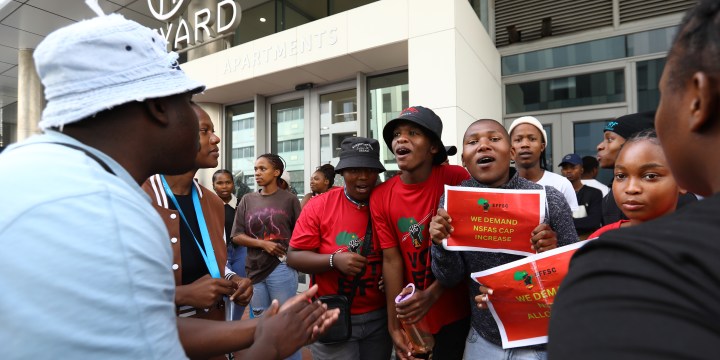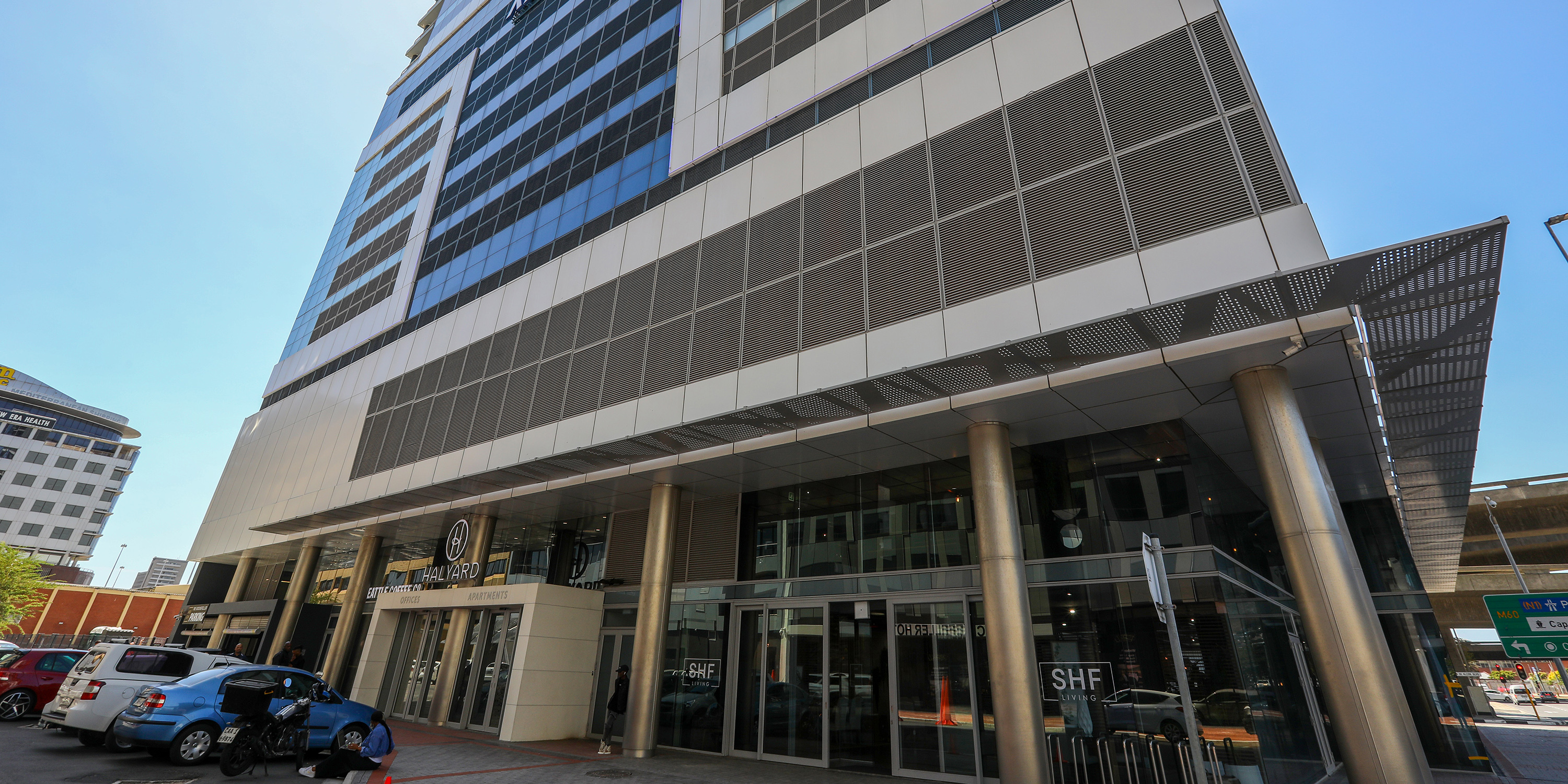INTERVIEW
National Student Financial Aid Scheme ‘is committed to finding solutions’ to accommodation problems

National Student Financial Aid Scheme spokesperson Slumezi Skosana says the organisation plays an important role in alleviating poverty in South Africa.
‘Protests at universities are disturbing. It is not an occurrence we would like to see each and every year, because it has a destabilising effect on the smooth commencement of university academic programmes. That is of concern to us, as a funder of 70% of the student population in the country.”
This was according to Slumezi Skosana, the spokesperson for the National Student Financial Aid Scheme (NSFAS), during an interview with Daily Maverick.
When asked why NSFAS had capped its accommodation allowances for students at R45,000, Skosana said it had done so to accommodate the middle bracket, where rentals range from R3,000 to R4,500 per month. It was felt that this was the appropriate bracket for their students.
In response to claims from students that the allowance was not sufficient, Skosana said price gouging and collusion had led to high costs of student accommodation. On 23 February, NSFAS released a statement in which it discussed reporting accommodation providers to the Competition Commission.
One of the solutions NSFAS is working on is accrediting accommodation providers that fit within their designated accommodation allowance.
When we try and improve our infrastructure, our space and whatnot, sometimes we are accused of being financially less prudent.
“The history has been that the players are limited. And if the players are limited, then the choice is also limited. So we said, let us broaden the space by inviting potential service providers which we would firstly, identify; secondly, accredit; and thirdly, grade. And then once they have been accredited and graded, make this list available to students.
“What we see as a solution to the affordability of accommodation is to place the cap and to also deal with the effect of the cap. We are in search of affordable accommodation because we are spending R18-billion per annum on accommodation. We are saying can we get some value from this? Because if we don’t pay that much money, we believe that we can help more students.”
Read more in Daily Maverick: Universities and SRCs still working to find solutions to NSFAS-funded students’ housing crisis
He said that at the end of the year, NSFAS would like to involve students in the grading of accommodations where providers that are below standard could lose their accreditation and grading.
“Now that we are engaging the students through their structures and we are engaging the universities and other institutions through their structures, we are confident they’ll be better.”
Accusations of being ‘financially less prudent’
Skosana addressed an investigation by the Organisation Undoing Tax Abuse (Outa) into the awarding of tenders and allocation of funding within NSFAS. In this investigation, one of the tenders flagged was the lease of the NSFAS head office at The Halyard building in Cape Town.
Outa notes that “the offices total 8,479 square metres and the cost over the rental period is R166.906-million, including VAT and escalations” which amounts to R33.3-million per annum.
Skosana justified this spending as an “improvement” to NSFAS infrastructure.
“And when we try and improve our infrastructure, our space and whatnot, sometimes we are accused of being financially less prudent, and of overexpenditure. Recently we have been accused of renting a building expensively and so on.”
Skosana said NSFAS moved its head office from Wynberg because of safety concerns for their staff and stakeholders.
“What we did, honestly, is that we were moving from Wynberg. You know Wynberg, it’s a residential area. And when you move from a residential area like Wynberg to a commercial hub [in] Cape Town [do] you expect to pay the same rent [as before]?”

The NSFAS head office in the Halyard building in Cape Town. (Photo: Shelley Christians)
He explained why their previous offices were not appropriate for the organisation.
“The facts are that the area was not safe for our staff members. It was small for a growing organisation. You find yourself in a situation where from a parking point of view, you’ve got to park across the road. Across a busy road, in the rain, in the sun and carrying a laptop to your car where in cases you might be hijacked and you might be exposed to all sorts of hazards.
“And it was not accessible to our stakeholders. Who are our stakeholders? Students who want to step in and come in and talk to someone when they have problems.”
Skosana says their new offices are much more accessible from a transportation perspective for students and other stakeholders such as portfolio committee members in Parliament.
However, Outa noted that NSFAS renting such an expensive office space while simultaneously “slashing the subsidies for student accommodation” was concerning.
Dispersing allowances
Skosana spelled out the “two-pronged” approach that NSFAS is taking with the dispersion of allowances. For universities, NSFAS pays allowances directly to the institutions to then disperse to the students. For Technical and Vocational Education and Training (TVET) colleges, NSFAS is piloting a system where allowances are paid directly to the students.
“In terms of the colleges, we are trying direct payment and we piloted it with our service providers to check if we can pay people directly. Because the colleges being, in many cases, rural institutions, they do not have the admin efficiency to handle this.
Read more in Daily Maverick: NSFAS — the state bursary scheme at the root of SA students’ outcry in 2023
“We give them the money and they struggle to disperse it, so we said, maybe all allowances, let’s rather pay these students directly. This is why we have come up with an NSFAS card that allows the student to withdraw the money at an ATM or swipe it at a shop.”
Skosana is referring to the NSFAS Bank Account that aims to “alleviate challenges experienced through the current allowance payment method as well as appropriately cater for the ever-increasing number of beneficiaries and large amount of funds to be disbursed”.
He notes that one of the biggest challenges with this system is fraud: “It is actually scary the way it is happening.”
NSFAS recently announced a 10% increase in its cost-of-living allowances for students.
Not waiting for protests to make improvements
Skosana remarked that despite dealing with a myriad of challenges, the impact NSFAS has made must not be ignored. He said NSFAS helps to alleviate poverty by providing poor and working-class people with access to higher education.
“By just taking them out of there, bringing them to these institutions, you are already contributing to poverty alleviation. Because you are going to pay tuition for this student, you are going to pay for accommodation, you are going to also give them allowances, food to eat.”
He said the organisation was committed to solutions. “We do not have to wait for the protests to flare up. We need to talk now and say, ‘Hey guys, last year you complained about allowances so this is our solution’.” DM


















 Become an Insider
Become an Insider
Comments - Please login in order to comment.